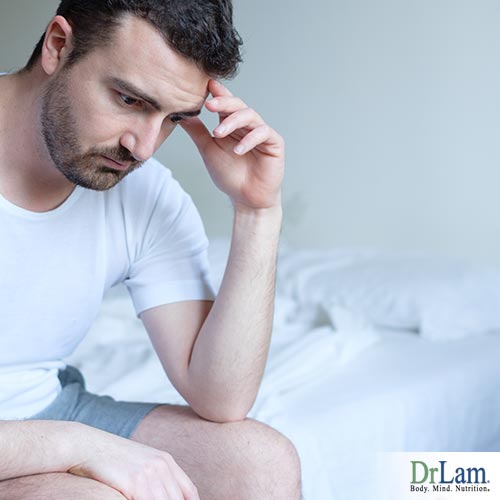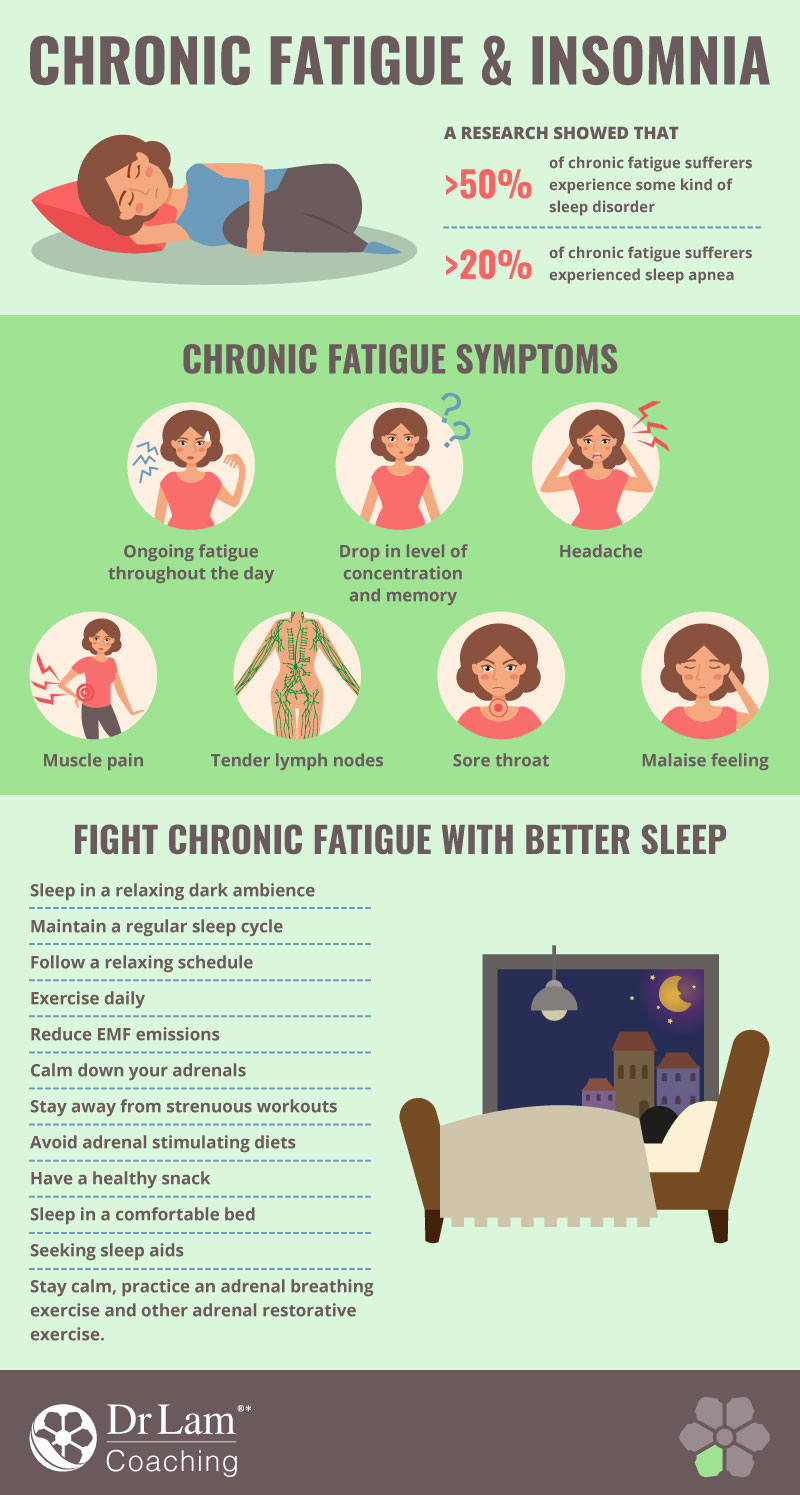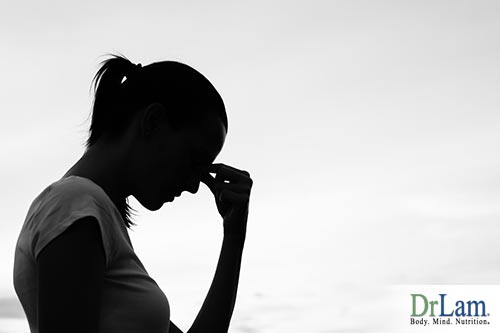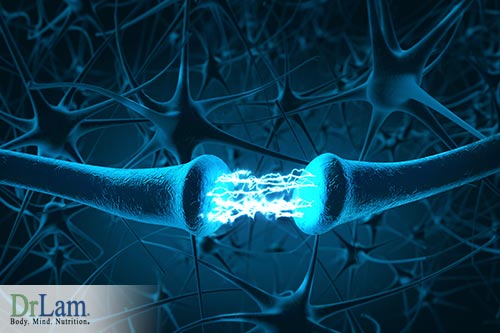 Chronic tiredness and insomnia are noticeable symptoms in adrenal fatigue. Adequate sleep is vital to make you feel refreshed and energetic the next day. Lack of sleep can leave you feeling drained and fatigued. Stress is one of the major factors contributing to insomnia.
Chronic tiredness and insomnia are noticeable symptoms in adrenal fatigue. Adequate sleep is vital to make you feel refreshed and energetic the next day. Lack of sleep can leave you feeling drained and fatigued. Stress is one of the major factors contributing to insomnia.
After a long working day, your body gets tired, and you fall asleep easily at night. However, if you are finding it difficult to fall asleep after a day’s work, then there could be possible reasons behind it. In many cases, people with high level of stress and anxiety are more prone to insomnia and fatigue.
Noticeable symptoms of insomnia include:
If you are feeling extremely tired along with experiencing any of the symptoms or group of symptoms that include insomnia, chronic tiredness, brain fog, low concentration level, difficulty waking up, tired during the day, irritation, salty food cravings, low energy levels and anxiety – then it may be an indication of Adrenal Fatigue Syndrome (AFS). High levels of stress are the main reason for AFS.
The NeuroEndoMetabolic (NEM) Stress Response is a natural self-regulatory system in your body which helps in fighting against high stress. The NEM is composed of six circuits: the Hormone Circuit, the Bioenergetics Circuit, the Neuroaffect Circuit, the Cardionomic Circuit, the Inflammation Circuit, and the Detoxification Circuit. All six circuits consist of organs and their interdependent connections, and they all coordinate to fight stress.
Adequate sleep helps to restore your body’s energy and prepare you for the next day. This is essential for recovering from AFS and other chronic conditions. However, having adrenal fatigue and any dysregulation of the NEM response can make resting and sleeping a challenge.
There are two main types of insomnia: difficulty falling asleep and difficulty staying asleep. There are also multiple reasons for having each of these conditions.
The adrenal glands and the HPA are part of the Hormone Circuit of the NEM. This circuit also contains the thyroid and reproductive organs. Cortisol is your body’s main anti-stress hormone, and it’s released by your adrenals. With higher levels of cortisol, your melatonin (or sleep hormone) can be negatively affected. This then makes it difficult to fall asleep (Sleep Onset Insomnia).
When you have adrenal fatigue, your adrenals work overtime to produce more cortisol. This cortisol has to be converted from DHEA, lowering the levels of DHEA in the body. This may then stimulate the release of norepinephrine.
Adrenaline and norepinephrine are your body’s “fight or flight” hormones. Therefore, excess adrenaline and norepinephrine makes resting and sleeping very difficult. They can lead to both Sleep Onset Insomnia and Sleep Maintenance Insomnia. These two neurotransmitters are major players in the NEM’s Neuroaffect Circuit. This circuit is heavily reliant on the quality of your sleep, and if dysregulated, can create serious sleep issues.
The Neuroaffect Circuit is composed of the brain, the autonomic nervous system (ANS), and the microbiome. Although all three are linked to sleep, right now we’ll focus on the part played by the ANS.
The ANS consists of the sympathetic nervous system (SNS), the parasympathetic nervous system (PNS), and the adrenomedullary hormonal system (AHS). When your body is under mild stress, the SNS becomes dominant. When stress is more severe, then the AHS takes over. The PNS is what helps your body to slow down, rest, and repair once either of the other two ANS branches has done its job.
The SNS and AHS together constitute the sympathoadrenal system (SAS). When the SAS increases its activity, you may experience a Reactive Sympathoadrenal Response (RSR). This response may then disrupt your body’s biological clock.
In adrenal fatigue, your body is not able to regulate your metabolism. Therefore, your blood sugar level may fluctuate frequently. This is especially common at night when your body goes for 6-8 hours without eating. If your blood sugar drops at night, this can cause your body to wake up.
The main cause of AFS and the dysregulation of the NEM is chronic stress. If chronic stress is not addressed, then it can lead to adrenal exhaustion which in turn can lead to symptoms of insomnia and chronic tiredness. It is vital to understand what is causing insomnia during the different stages of sleep. This will allow you to pinpoint the nature of the problem and the best way to address it.
Insomnia is common in people with chronic tiredness. Sleep disorders, non-refreshing sleep, and disruptive sleep are some of its major symptoms.
Noticeable symptoms of chronic fatigue include:

Scientists conducted research on chronic fatigue and its relation with insomnia. The study included a large group of chronic fatigue patients.
During the research, the following observations were revealed:
Insomnia is a critical component of AFS symptoms. According to studies, people with chronic fatigue have disturbed sleep cycles which result in a lack of restorative sleep. Sleep disturbances are often linked to the excess stress of the previous day or a need to go to the restroom. It is important to understand the need to manage insomnia and what could be done to manage it as good sleep is the basis of healing.
Let us understand the various stages of sleep. There are five stages in your sleep:
Stage one: This is a state of extremely light sleep. You are semi-conscious in stage one which means your limbs are still active. Hence, in this state people often kick or move their limbs in sleep reacting to the mental images.
Stage two: This is similar to stage one with an increased paralysis of your limbs.
Stage three and four: These are the two stages where you sleep deeply – also known as slow wave sleep. During this state, most of the growth hormones are secreted. Also, your body renews and repairs itself in this period. Adequate sleep during these two stages plays a crucial role in rejuvenating and recovering your body from stress.
Stage five: Rapid eye movement takes places in this state where you have vivid dreams. Dreams can occur in the above stages as well.
Studies show that when compared to healthy people, those with chronic tiredness experience less time in the slow-wave sleep and rapid eye movement stages. However, researchers have suggested a link between systemic inflammation and disruptive sleep cycles.
Systemic inflammation can be seen in chronic fatigue patients which may be a contributing factor for persistence non-refreshing sleep problems. According to another study, sleep disruptions occur in chronic patients due to alterations in the nervous system.
Such patients experience changes in the nervous system functioning during waking hours which can further continue even during sleep. Several studies have been conducted which show a that chronic patients experience disruptions in normal nervous system functioning during sleep. This may be the possible cause for disturbed sleeping patterns and low quality sleep.
Balance in levels of cortisol, adrenaline, and melatonin ensures healthy sleep. High stress can cause an imbalance in the secretion of these hormones. In the second stage, glands release more cortisol. High cortisol in your body causes fluctuations in the level of adrenaline and melatonin resulting in poor sleep.
In the third stage of adrenal fatigue, your adrenal glands are overburdened from continuously pumping of cortisol. They lose the ability to secrete cortisol which reduces your body’s ability to fight with stress. As a result, you feel more exhausted than before. The cortisol levels are inadequate for maintaining blood glucose levels between meals and during the night. To compensate for this, your body secretes adrenaline to maintain life and avoid hypoglycemic coma.
More adrenaline secretion activates the sympathetic nervous system which makes you feel anxious, weird and alert. Disturbed sleep patterns and waking up in the middle of sleep are signs of adrenal spikes. Sleep maintenance insomnia is common.
Using herbs to suppress the problem can cause a counter-response leading to an increased adrenaline release. This is because the adrenaline hormones are there to compensate low levels of cortisol. Balance in cortisol levels is therefore a crucial factor for restful sleep.

Besides adrenal fatigue, there are various factors that contribute to insomnia which include:
Difficulty in falling asleep is referred to as sleep onset insomnia. For you to fall asleep, multiple neurotransmitters and hormones work together in your body. Certain hormonal imbalances in your body can also cause insomnia leading to chronic fatigue.
Here are some of the hormonal imbalances which may cause insomnia:
Improper functioning of the Hypothalamus-Pituitary-Adrenal (HPA) axis is one of the common reasons for insomnia. Your adrenal glands are a part of HPA axis. Hence, insomnia that leads to chronic tiredness is a symptom of adrenal fatigue.
Besides carrying out the function of managing stress, anti-stress hormones cortisol and adrenaline also play an active role in falling asleep. Regulated cortisol levels ensure good sleep. For normal sleep, cortisol levels need to be highest in the morning and lowest in the night.
 When this balance is disturbed, it causes irregular sleep or insomnia. In people with adrenal fatigue, high stress is observed during the first phase. High stress triggers your body to secrete excess cortisol for dealing with the continuous stress throughout the day. Some of this excess cortisol remains in your body until night – thus disturbing your sleep.
When this balance is disturbed, it causes irregular sleep or insomnia. In people with adrenal fatigue, high stress is observed during the first phase. High stress triggers your body to secrete excess cortisol for dealing with the continuous stress throughout the day. Some of this excess cortisol remains in your body until night – thus disturbing your sleep.
Excess cortisol levels cause fluctuations in secretion of adrenaline and melatonin causing poor sleep. High stress causes excess secretion of cortisol. This in turn triggers the adrenal medulla for excess secretion of adrenaline hormone. High adrenaline levels can also disturb your sleep patterns.
During adrenal fatigue, high levels of cortisol and adrenaline keep your body on alert thus leading to insomnia. Though you are physically tired, your mind is in an active state which affects your ability to fall asleep.
The pineal gland in the brain secretes melatonin hormone which plays a vital role to ensure deep sleep. High cortisol level and light inhibits its secretion. Hence a raised cortisol level or lights from a lamp and electronic devices during the evening lowers melatonin secretion. This pattern can often be found in stage two of adrenal fatigue during which cortisol level is high to cope with the stress. During this stage people experience inadequate sleep.
Disorder of thyroid, estrogen and growth hormones including a subtle imbalance in endocrine levels can also be among the factors that can cause poor sleep.
Prolonged exposure to stress and anxiety can cause sleeping problems. Most people have trouble falling asleep due to stress and anxiety. Fears and stressful thoughts make people stay awake. When this continues, it further develops into anxiety leading to insomnia. Studies suggest that insomnia can lead to anxiety disorders.
People with adrenal fatigue have high stress levels which affect their ability to sleep. Continuous stress and anxiety can lead to depression and worsening their sleeping problem even further. Psychological disorders can also cause insomnia symptoms. Studies suggest that insomnia may trigger or sometimes worsen depression. Mind relaxing techniques, following a fixed bedtime schedule, and healthy sleep practices can greatly help in improving anxiety and sleeplessness.
Poor lifestyle and unhealthy food habits have a great influence on your health including sleep. Irregular sleep timings, caffeine, nicotine and alcohol, junk foods, and refined sugar are all sleep offenders. Achieving a relaxed mind and maintaining a fixed time to go to bed aids in falling asleep easily.
Caffeine, nicotine, and alcohol are brain stimulators. Hence, any overindulgence has direct influence on your central nervous system thus interfering with the quality of your sleep. Health experts recommend avoiding stimulants close to bedtime.
Avoid late night heavy exercise and late night shows as they increase cortisol levels in your body which prevents you from having a good sleep. Moderate to light exercise every day is known to promote better sleep.
Certain medications when taken for a longer duration can cause considerable side effects including insomnia. Weight-loss products, painkillers, decongestants, and medications containing stimulants such as caffeine can interfere with your regular sleep patterns. Severity of sleep disorder varies from person to person based on the drug.
Some of the medications that may cause sleep disruptions are:

A spacious room, clean fresh smelling linens, a comfortable bed and pillows with orthopedic support, along with the right room temperature can all make a huge difference to the quality of your sleep. Sleep in a comfortable and relaxing environment.
Make sure your room is dry and clean. Make sure you vacuum once or twice a week to get rid of dust. Avoid bad sleeping habits such as listening to loud music on earphones or using cell phones before sleep. You can always put on some soft music to relax your mind. Avoid naps during the daytime as they can interfere with your regular sleep.
Pain can prevent you from falling asleep. It is estimated that over 50 to 80 percent of people with chronic pain have ongoing disturbed sleep. Back pain is one of the main factors that interfere with sleep. Studies reveal that pain is the major factor that contributes to insomnia.
The most prevalent sleep disruptions that people with chronic pain suffer from are difficulty in falling asleep and waking up in the middle of sleep or before time to get up. Many patients with chronic pain suffer from chronic tiredness. This is due to non-restorative sleep as they wake up in the middle of sleep.
In restless leg syndrome (RLS) the person experiences uncomfortable sensations in the legs including itching, creepy crawling, and/or pins-and-needles feeling. There is an urge for leg movement including involuntary jerking during sleep or when the person is just about to fall asleep. These symptoms cause waking up during sleep and interfere with the sleep cycle.
Research indicates low ferritin levels as the major factor for RLS. Iron deficiency and mild anemia have also been linked with RLS. According to research, people with lower iron levels have reported RLS. Less iron absorption by the body is also known to cause RLS.
Sleep apnea has been linked with insomnia. Surveys suggest that 50 to 70 percent of people with insomnia have sleep apnea. It further reveals that 40 to 60 percent of people with sleep apnea reported insomnia symptoms.
In sleep apnea, the person’s airways get obstructed partially or completely during sleep resulting in disrupted breathing. The person experiences shallow breathing or even stops breathing.
Due to pauses in breathing and drop in the oxygen level, the person repeatedly wakes up in the middle of sleep. A sleep study helps diagnose sleep apnea. Its adrenal fatigue treatment involves quitting smoking, losing weight, and/or wearing a sleep mask referred to as a continuous positive airway pressure (CPAP) device.
 Your body contains neurotransmitters which are chemicals that enable communication between neurons. They stimulate or calm the body. When neurotransmitters are in balance, the body functions smoothly. However, any overstimulation causes discomfort ranging from mild to severe illnesses.
Your body contains neurotransmitters which are chemicals that enable communication between neurons. They stimulate or calm the body. When neurotransmitters are in balance, the body functions smoothly. However, any overstimulation causes discomfort ranging from mild to severe illnesses.
High stimulating neurotransmitters cause anxiety, waking up in the middle of sleep, and even nightmares. On the other hand, low levels of calming neurotransmitters make you restless and jittery. Research suggests that 80 percent of Americans presently have an imbalance of neurotransmitters. Environmental toxins, unhealthy food habits, stress, and genetics are some of the factors that cause this imbalance.
In certain cases, insomnia and fatigue may require medication and hormones. For your body to function smoothly, metabolic byproducts need to be eliminated from time to time. The liver has to metabolize hormones and medications.
People with weak bodies tend of have a slow metabolism and congested livers. Hence, excess hormones and medications can further exert more load on the liver and worsening congestion resulting in fatigue and sleep disturbance.
High stress affects the Hypothalamus-Pituitary-Adrenal (HPA) axis and adrenal glands. High cortisol keeps the body in an alert state. Cortisol level needs to be high during the day and gradually drop in the evening. High stress is found in people with adrenal fatigue which leads to more cortisol secretion. Cortisol dysregulation can impede the secretion of sleep hormones, making it difficult to go to bed. High cortisol levels can also increase adrenaline secretion which interferes with your regular sleep pattern.
Glandular supplements have stimulating effects on the nervous system. While this helps the body to handle stress, excess intake of such supplements can cause overstimulation and resulting in poor sleep. As a result, people do not feel refreshed after sleeping and that leaves them feeling fatigued all the time.
Caffeine found in green tea stimulates the brain to release cortisol hormones to combat stress. This is similar to the situation when your body detects stress. Hence, taking stimulants can worsen any sleep disorder and fatigue.
Vitamin supplements work differently than natural compounds. Therefore, care should be taken while using them. Vitamins B and C are included in those potentially helpful for relieving adrenal fatigue. The effect of vitamin supplements varies from person to person, so it is vital to take the right dose to heal the adrenals. High doses of these vitamins can impede sleep hormones and cause sleeplessness.
These include copper, zinc and selenium. The intake of minerals can help in the repair process of the adrenals. Tiny amounts of these minerals can do the work, but an overdose can cause reverse effects and worsen the situation.
Better sleep restores your body’s energy and helps fight chronic tiredness.
Here are useful tips to ensure better sleep:
Melatonin actually helps you in falling asleep. Melatonin hormone secretion is active with the absence of light. Hence it is advisable to sleep in a comfortable dark room to enhance the secretion of sleep hormones. Make sure you draw the curtains of your room as even a little ray of light can impede melatonin secretion in your body. Turning off light emitting devices can really make a great difference in experiencing good quality sleep.
Set a fixed time for falling asleep and waking up. Following a schedule prepares your body accordingly for the sleep-wake cycle which promotes better sleep. This helps you to fall asleep with ease. Prior to sleep, indulge in a relaxing activity such as having a lukewarm bath, meditation, listening to soft music, or reading a book. Repeating the activities on the same time every day before going to bed prepares your body for sleep.
Make sure you go to bed early. Practice an adrenal breathing exercise every day only before bedtime. Following a bedtime relaxing routine will enable your body to transition toward better sleep.
 Adrenal stretching exercises can be done in the afternoon. Low-impact aerobics can be done post dinner provided your body does not experience feeling drained immediately afterwards.
Adrenal stretching exercises can be done in the afternoon. Low-impact aerobics can be done post dinner provided your body does not experience feeling drained immediately afterwards.
Keep the electrical appliances away from your bed as EMF emissions from them can interfere with your sleep patterns.
Switch off loud music, adventurous video games, TV, computer, cell phones and other devices to prevent trigger of adrenal rush during the evening after 6 p.m. Instead spend time on reading books in a calm environment.
Avoid strenuous exercises such as power yoga poses as they can stimulate the sympathetic nervous system which is especially found in high adrenal fatigue patients.
Foods that stimulate the adrenals need to be avoided. Keep away from caffeine, decaffeinated drinks, sugary foods, green tea, hydrogenated fats, artificial sweeteners, and other foods which stimulate your adrenals. Keep away especially from chocolate, nicotine and alcohol.
Light snacks containing protein and fat before bedtime promote sleep. Pairing foods rich in tryptophan with healthy carbohydrates helps to calm down brain and induce sleep.
A good comfortable bed with clean linens ensures your body gets the orthopedic support and relaxed feeling highly essential for better sleep. Make sure you set limitations for pets and children in your bed (when possible) as they may often disrupt your sleep.
Chronic tiredness and insomnia can sometimes need the help of natural sleep aids. Consult your doctor regarding this. There are various natural sleep aids with special characteristics. It might take a little bit of trial and error to find the right combination that matches your need.
 If you are unable to fall asleep then you may get up and practice an adrenal breathing exercise and other adrenal restorative exercise. Adrenal fatigue patients have a feeling of being tired and wired. The mind keeps on running even before bedtime and just seems unstoppable. Do not get angry or anxious if you are unable to fall asleep as it will raise your level of stress only aggravating your sleep problem. Instead maintain a positive feeling, imagine relaxing places and events to lighten up your mind.
If you are unable to fall asleep then you may get up and practice an adrenal breathing exercise and other adrenal restorative exercise. Adrenal fatigue patients have a feeling of being tired and wired. The mind keeps on running even before bedtime and just seems unstoppable. Do not get angry or anxious if you are unable to fall asleep as it will raise your level of stress only aggravating your sleep problem. Instead maintain a positive feeling, imagine relaxing places and events to lighten up your mind.
Sleep plays a crucial role in repairing and rejuvenating your body. Insomnia can disturb your whole body cycle besides causing chronic tiredness. One of the major reasons for insomnia is high stress, prevalent in adrenal fatigue. Such people have high cortisol levels which interfere with sleep patterns. Hence they tend to wake up frequently during sleep which leads to non-restorative sleep thus leaving them tired. However, there are several factors that contribute to insomnia and fatigue. Chronic tiredness, insomnia, and adrenal fatigue are all interrelated and complicated.
Therefore, it is crucial to understand the underlying cause before working out a solution. Insomnia and fatigue (if left untreated) can take a toll in your daily life. Seeking advice from a health expert or professional consultation is highly recommended to evaluate the problem, better identify its root cause, and arrive to a suitable solution accordingly.
Caffeine is a stimulant that directly acts on your central nervous system. It stimulates the brain to release cortisol hormones. When our body is under stress, the brain sends signal to secrete cortisol hormones for dealing with stress. Caffeine overdose exerts pressure on your adrenal glands for repeated secretion of anti-stress hormones thus overburdening them. Ultimately, your adrenal glands can no longer secrete these hormones thus reducing the body’s stress handling ability. Also, increased cortisol levels impede sleep hormone secretion causing insomnia resulting in chronic tiredness.
